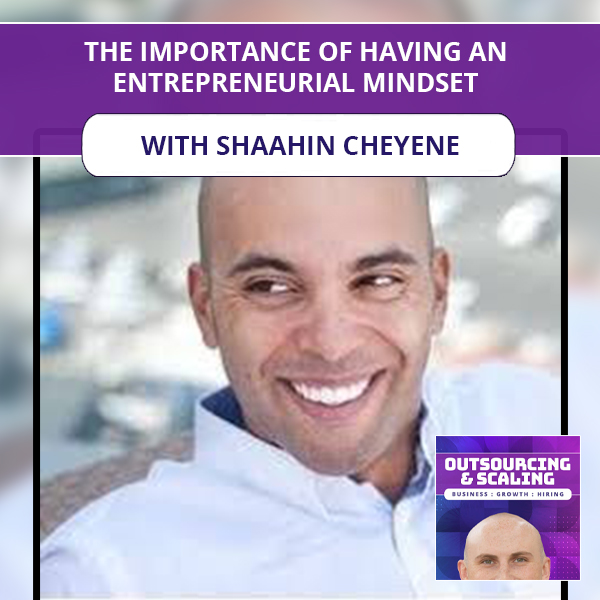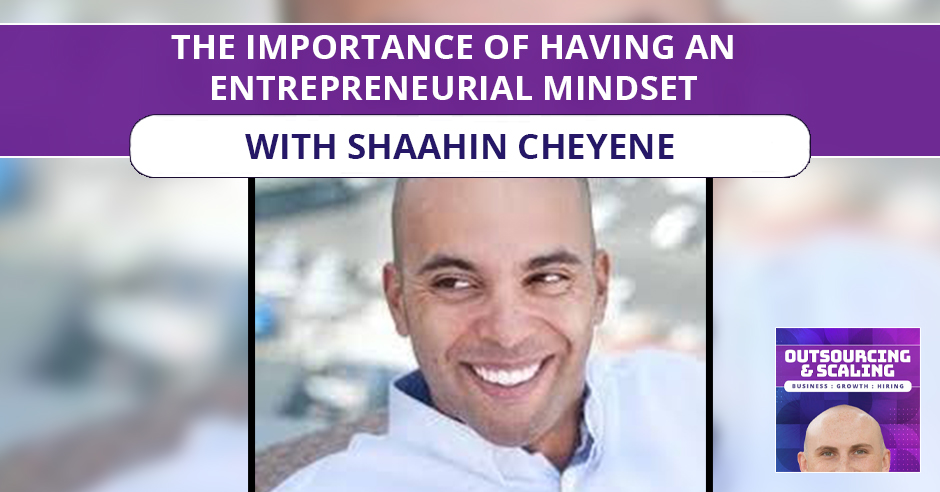


When you have very clear life goals, there is no stopping you from achieving it no matter what. Today, Nathan Hirsch interviews product innovator, leading Amazon Expert, and Herbal Ecstasy creator, Shaahin Cheyene. Here, he shares what it was like to be a successful entrepreneur as a teenager. He then imparts two crucial business decisions, entrepreneurial mindset and skillset, that he made to grow his office and business in general. Shaahin explains the best hiring strategies, mistakes to avoid, and ways in building strong systems that offer the highest chances of success. Refill your brain with more entrepreneurial knowledge as Shaahin also discusses the Amazon system and the right time to utilize it.
—
Listen to the podcast here:
[smart_track_player url=”https://www.podetize.com/statsapi/www.podetize.com/wp-content/uploads/fileuploads/11-5b145ef137b51b3d1af0633e9305c43d/02/2020/22bb17e924d96d2bcf2a67652e406cba.mp3″ title=”The Importance Of Having An Entrepreneurial Mindset With Shaahin Cheyene” artist=”Nathan Hirsch” image=”https://freeup.net/wp-content/uploads/2019/04/OAS.png” ]
Download the audio file here.
The Importance Of Having An Entrepreneurial Mindset With Shaahin Cheyene
My guest is Shaahin Cheyene. How are you doing?
I’m doing great, Nathan. How about you?
I’m doing great. I’m excited to have you on. For those of you that don’t know, he is a product innovator having sold over 500 million in products in his career. He’s widely considered the leading Amazon expert. We’re excited. We’re going to talk all about that plus the cool stuff you have going on with your company. First, let’s take a gigantic step back. What were you like as a kid growing up? Were you a straight-A student? Were you a rebel? Did you always know that you wanted to be an entrepreneur?
I was neither of those. My family immigrated to the United States. We were refugees and a solidly middle-class family. Right around fifteen years old, I decided I wanted to leave home and seek my fame and fortune because the opportunities available to me were nowhere near what I wanted to achieve. I left home. All I had was a few hundred bucks. I bought a broken down Lincoln Continental that managed to get me about twenty miles away from my house under a freeway underpass. I had to get out and push the car where it stopped. I ended up living in the back trunk of that 1969 Lincoln Continental not running for almost a year.
I was down and out. I was living on ketchup and hot dog buns. I was foolishly vegetarian at the time and that was the only thing I could afford to eat. I was reading Think and Grow Rich. I had the pages of the book pasted to the ceiling of the trunk. This was before the internet, before cell phones. I would use a flashlight to read the pages at night and then go to sleep and wake up and try to figure out what the next plan was. One day, I went to get a bite to eat, it was the last money that I had. I was like, “Today is the day. I’m going to get a sandwich.” I went out to get a sandwich. I came back and the car was towed.
It was at that moment that I knew I had to come up with something fast. I went to the library. I met this guy who ended up being a great mentor in my life. I ended up designing one of the first smart drugs ever created, this product called Herbal Ecstasy. At the time, the rave scene was huge. There was no internet still. Internet was in its infancy, but it was the raving club scene was the place to be. What I did was there was a shortage of ecstasy, which was the most popular party drug. It was legal for a minute in the ‘80s and then illegal in the ‘90s, but it was gone. I somehow, in my teens, came up with a formula for an all-natural version of it and had to get it distributed.
I had no clue how and this mentor mentored me. Basically, what I ended up doing is going to the salespeople inside the clubs and getting them to sell my legal product instead of their illegal product. What happened is one guy did it, he came back, he was like, “This is amazing. I made more money than I’ve ever made and there’s no risk. Are you sure this is legal?” I said, “Absolutely.” It expanded to 2 people to 1,000 people to 50,000 people. We were in every store between 7-Eleven and GNC. I had offices in 32 countries, over 200 contractors. It became one of the largest supplements ever. We were making about $350 million a year when I was still in my teens.
What gave you the drive? I became an entrepreneur when I was twenty so I get it, but I think the average 15, 16-year-old is playing video games or focusing on school. Where is your drive saying, “I want to be different. I want to go all out to be on the top?”
You have to remember I was an immigrant from Iran. I was growing up in Southern California where there’s wealth all around you, but none for you. You’ve got to go to school, maybe become a doctor. Maybe by the time you’re 50, you’ll have a wife, two kids, a whole mountain of debt, and probably a nice Mercedes car. That was not the path that I wanted and nobody could show me the path to the guy driving the Ferrari down the street. I remember the one job I had was I worked at a copy shop back in the day. It was at Kinko’s Copies, maybe before your time but there was a large volume of photocopies. They gave me a job. I lied about my age. At night, I would sleep behind the copy machine and the manager knew that I didn’t have a place to live. I would sleep behind the copy machine because it was warm. I could get a couple of hours before I had to go back to the Lincoln. I remember one day I got kicked and I said, “What happened?” It was this big fat demon of a manager standing right there above me. He had caught me sleeping behind the copy machine on my break time. He kicked me out and I never got my weekly salary.
I’m going to take you forward to the success of Herbal Ecstasy. I had made several millions of dollars. I had bought a brand-new red Ferrari, which is in rosso corsa, a color specific to Ferrari, and with brown leather seats. You could smell the leather on me. It was new and nice. I had a beautiful young lady with me and I was going to one of the fanciest restaurants in town. I remember getting out of the Ferrari and handing the keys to the valet. Looking to my left and you’ll never believe who I saw, it was the manager. He was fatter than ever. A few months before, he had kicked me out. The guy did a double-take. It was almost like he didn’t know what he was looking at and his eyes started getting red. His face started getting red, but then he shook his head like it couldn’t possibly be me, which I walked up, shook his hand, and smiled. That was the moment I knew that I had arrived.
Walk me through. You’re a teenager. You have these different offices. You have people working for you. What was that like? Did people take you seriously? How did you run meetings? How did you give directions at that age? Did you have all the confidence in the world to get that done?
I had some mentorship at the time and then the rest of it, remember pre-internet, you can Google stuff. It was trial and error. We have to figure it out. When you’re in your late teens, early twenties you’re invincible. If nobody has told you that you can’t do it or if nobody’s shown you that you can’t do it. I’m sure there are lots of naysayers and people that it goes straight over their heads. If no one’s shown you that you can’t do it and you’re stubborn like I was, there’s nothing stopping you. When there’s nothing stopping you, you have an incredible amount of opportunity at your fingertips.
Can you walk people through what you did from that point? How did you grow it to 32 offices? What mistakes did you come across on the way? What business decisions did you have to make?
There are two things. The first thing is the mindset. The second thing is a skillset. Do you know the difference between a mindset and a skillset? Skillsets can be purchased or rented, that’s knowledge. A mindset needs to be cultivated. With the right skillset, you can achieve tasks. Skillsets fall under the category of tactics. Objective, tactics, strategy, the three things that you need to achieve and the three things you need to succeed in any business situation. Mindset falls much more so under objectives. Mindset is the all-encompassing cultivation of who you are. If you have the right mindset, then you can buy the skillsets, knowledge and information, but the mindset you can’t buy. That’s the thing that you have to cultivate.

In the people that I mentor and the students that I have, I mentor a lot of young people, startups, I cultivate a mindset because you can accumulate as many skillsets as you need or you can rent that knowledge. Once you have the mindset together, that’s how you get to where you go. For me, it was a mindset. It was a mindset of invincibility. It was a mindset that nobody could stop us. It was a mindset of high competition. I am a competitive person. You’ll know this is one of the things that have been studied at a couple of major universities is the people who are competitive have a higher likelihood of success. You don’t necessarily have to win every competition, but those that are competitive perform better. You can watch it on kids. The ones that are more competitive on the soccer field, in the dojo, wherever they’re at are usually the ones that end up doing better in life.
You have a lot of students. What are some of the mistakes that you see them make or the mindset that they have that you try to tradition over to your mindset?
There is a lot of skillset stuff, which is people worry about not having enough money. That’s a skillset. You can get money. People worry about not having a specific skillset like with Amazon. How do I rank? How do I get social proof? How do I do all this? They worry about that and they miss the bigger picture. The bigger picture is your mindset. What I teach and encourage people to do is to build up the mindset of success and the skillset, you can work it out. Knowledge, courage, action are the three things you need. Knowledge, you can buy it, you can rent it. Some people steal it. I wouldn’t recommend that. Once you have the knowledge, what does that give you?
An opportunity to take action.
Courage. If I tell you, “Jump out of a plane,” you’d be like, “I know nothing about jumping out of a plane.” Once I tell you, “Here, you’ve taken the class, you understand it,” that knowledge is going to give you that courage. Once you have the courage, you take action. It’s courage, action, objectives, tactics, strategy.
You have people and you built your own teams. Is this something that you relay to the people that you’re hiring, that you put them in that position to use their skillset in that way? Is that more of an entrepreneurial mindset?
We strongly believe in outsourcing. I have a small staff here in Los Angeles. Our offices are based by LAX. We also have offices in other states and in other countries. Depending on what we’re doing at any given time, we will bring on up to 200 outsourced people from South America, Central America, Asia, India, you name it, to do those things that we need to do. There are different levels of outsourcing as well. You’ve got high-level outsourcing, which we usually find in South and Central America where the education levels are really high. If it’s a specific tactic that we’re using and we need a specific skillset, usually technical skillsets like super high-quality design, programming, coding, those types of things. Russia, Ukraine, any of the Eastern bloc countries are inexpensive and high quality. If it’s labor force, Southeast Asia is phenomenal for that.
What about hiring tips in general? If someone was asking you for your best hiring tips, your best hiring strategies, mistakes to avoid, what’s your best advice there?
The best advice I could give you there and to your point, one of the biggest mistakes that entrepreneurs make is that they find a hole in their organization and they look for somebody who’s going to fill that hole. The problem with that is you’re asking somebody to solve your problem. You’re asking somebody to come in and fix something that you haven’t fixed yet, that you don’t know how to fix, and you’re setting them up for failure. We don’t hire like that. The way we hire is we build our systems, we build our techniques, objectives, tactics, strategy. As an entrepreneur, those are the things that you need to build yourself. No one else can do that for you. No one can give you your objectives. Nobody can tell you your tactics. Nobody can give you a strategy. You build those three things by getting the knowledge. You can ask people to help you establish and cultivate those, utilizing your success mindset. Once you have that established, then you bring somebody in and that person becomes labor and that person undertakes those tasks. You’re giving a much higher chance of success. They have to follow a checklist in order to succeed as opposed to solving your problems.
What about advice for building those systems and building strong systems that give you the highest percent chance of success?
Building systems is interesting. When I started my first company, the ecstasy company, I was flying by the seat of my pants. I had one system and that was it. Make a lot of money that the mistakes you make won’t matter. That is a system and it’s a valid system. That’s what I did. Unfortunately, I burned millions of dollars as well, which I could’ve kept in the latter times of that company that would have been helpful. There’s a bunch of different ways to think about that. Ultimately, the main thought that I have there is pre-planning. You build out your systems, you plan ahead for everything. There’s much great software out there, things that we didn’t have access to. We use one called Asana, there’s Slack. There are tons of great project management software. At the end of the day, you need a trusted system and we like to use GTD, Getting Things Done, David Allen’s system. Are you familiar with that at all?
I’m somewhat familiar with it. I know who David Allen is.
David Allen wrote the cannon on productivity, this book called GTD or Getting Things Done. It’s the foundation for anybody who’s successful and has used some organizational productivity methodology and David is born on the finest out there.
Let’s shift a little bit. Let’s talk about Amazon. What is your take on Amazon now? I started in 2008, 2009. It’s way different than it is now. What’s your take on the environment and where it’s going?

Amazon is a dual-edged sword. I’m a big believer in Game Theory. It teaches us that in any transaction or situation, each individual is looking out for himself. Companies, when they reach a certain point, also start looking out for themselves, similar to government. The government starts looking out for the government. Amazon, interestingly enough, is big. It’s one of the biggest companies in the world, one of the four horsemen, Amazon, Google, Facebook and Apple. It has gone to the level where Amazon is only interested in looking out for Amazon. It’s trickle-down economics. They say, “We’re the most customer-centric company in the world.” Why? It’s because they know that’s what’s put them forward and that’s what’s going to continue to push them forward. They do that.
Amazon has access to cheap capital, cheaper than anybody else. They can achieve amazing things. They can achieve incredible things. They can buy our sources of communication, like Bezos bought The Washington Post. They can go out there and buy rocket ships. They can go out there and control banks. They can go out there and control communications. Amazon is much more than what we see them as, but as we grow, being Amazon sellers, what we do notice is that there are a lot of emerging markets. Amazon has become such a big ocean that a lot of its segments have become red. By that, I mean the blue ocean and red ocean strategy. Blue ocean is a big wide part of the ocean where you can swim and there’s nobody else.
As more people come in, that part of the water gets red. I do avoid red ocean and get more into the blue ocean, but that becomes increasingly more difficult on a platform like Amazon. We see a lot of emerging markets. Walmart launched their Walmart Prime. We’re looking at Etsy and eBay now as well. eBay used to be the big player if you remember before Amazon. It’s making a comeback. There are platforms like Wish which has a lot of work to do, even though I heard they were offered some crazy billions of dollars by Amazon and they didn’t sell. They have some quality work to do. There’s Alibaba, which is making some big moves in Asia. As a seller, you have to go back to objectives, tactics and strategy.
If your objectives are to make X amount of money over a period of time, do you care how you’re going to achieve that? Do you care if you’re selling it on Amazon or diversifying through these other platforms? If you’re diversifying, maybe you’ll have a subscription base. We have several subscription businesses that we do. Maybe you’ll do a subscription box. Maybe what you’re going to do is diversify your business all around and into brick and mortar even. What we see now with our clients and with the brands that we represent is that everybody is all about diversification. How do we get out from under the thumb of the four horsemen and more into our own independent thing where we utilize them, it’s nice, it’s the icing on the cake, and we love the money that they bring? In the event that something happens, we’re diversified enough where our business won’t suffer for too long.
That’s all about growing the brand. That’s what the focus of it is if you can go after your target market, I’d love to hear your thoughts, and build a community of raging fans that know your brand, that supports you over other similar products. How do you do that more and more as we get bigger, as everyone starts to do the same thing? Do you have any thoughts on that?
Amazon already has its raging fans. I’m not sure that applies to the Amazon platform because Amazon has become much more a commoditized market than anything. I always tell people it’s not the best place in the world to launch a new and innovative product. You and I both know that if you came to me and you’re like, “Shaahin, I have the most amazing headphones in the world and they’re much better than all the other headphones. They cost $400, $500 but they’re amazing headphones. They’re better than the Beats and all the Bose and all those.” I’d be like, “You need to do a Kickstarter and you need to make it as exclusive as possible and do not sell it on Amazon platform.” When you get traction, you make your first 5 million, 10 million units, then let’s talk, let’s get and utilize their traction to sell to other people who are buying other headphones.
It’s at the moment, sadly, not a platform that fosters innovation. Rather, if you came to me and said, “Shaahin, I’ve got these headphones that I can get for $6 in Asia and they suck but they look cool. The one above from me is selling $1 million a month and the one below from us is selling $50,000 a month. I think I can make $200,000 a month,” that’s where Amazon comes in. Now, what you’re lacking was distribution. Now that you’ve got distribution, then all you’ve got to do is go in and game Amazon. Like everybody, all these other sellers are doing it. How many sellers are there on Amazon?
I don’t even know, hundreds of thousands, if not more.
It’s in the millions. It was two million in 2017. I’m wondering how much is that, but that’s a good piece of information. Probably they’re up to 3 million or 4 million sellers.
Can you tell people more about your company? Where can they reach out to you?
I’ve got two companies that I’d like to share with you. I’ll tell you first about a new company that we launched and it is called Amazon Seller Protection. You can go to the website AmazonSellerProtection.com. What we do is we offer legal services for Amazon sellers. It’s an insane deal. We use one of the largest law firms in the country and it is a flat-rate plan that you pay monthly. It’s like AAA for legal services. I am sure that the law firm that we use is losing money on our clients and us. I recommend people sign up as soon as possible. It’s $39 starting a month. You get unlimited legal services and unlimited legal letters. We stop counterfeits. We write letters to Amazon in case you ever get suspended or you get notices from Amazon. It’s all done free on the letterhead of a major law firm. You can consult with major attorneys. People can look me up, ShaahinCheyene.com. I run a full-service Amazon agency as well where we take Fortune 50, Fortune 500 brands all the way down to startups and we accelerate them on the Amazon platform using the latest in technology and AI algorithms.
This has been great and a lot of fun. I learned a lot. Thanks for coming on. Have a great trip to Africa.
Anybody who’s coming to Africa, we’ll see you at the Winning Edge.
Important Links:
- Shaahin Cheyene
- Think and Grow Rich
- Asana
- Slack
- Getting Things Done
- AmazonSellerProtection.com
- ShaahinCheyene.com
About Shaahin Cheyene
 Shaahin Cheyene is a product innovator having sold over $500 Million in products in his career.
Shaahin Cheyene is a product innovator having sold over $500 Million in products in his career.
He is widely considered the leading Amazon expert.
